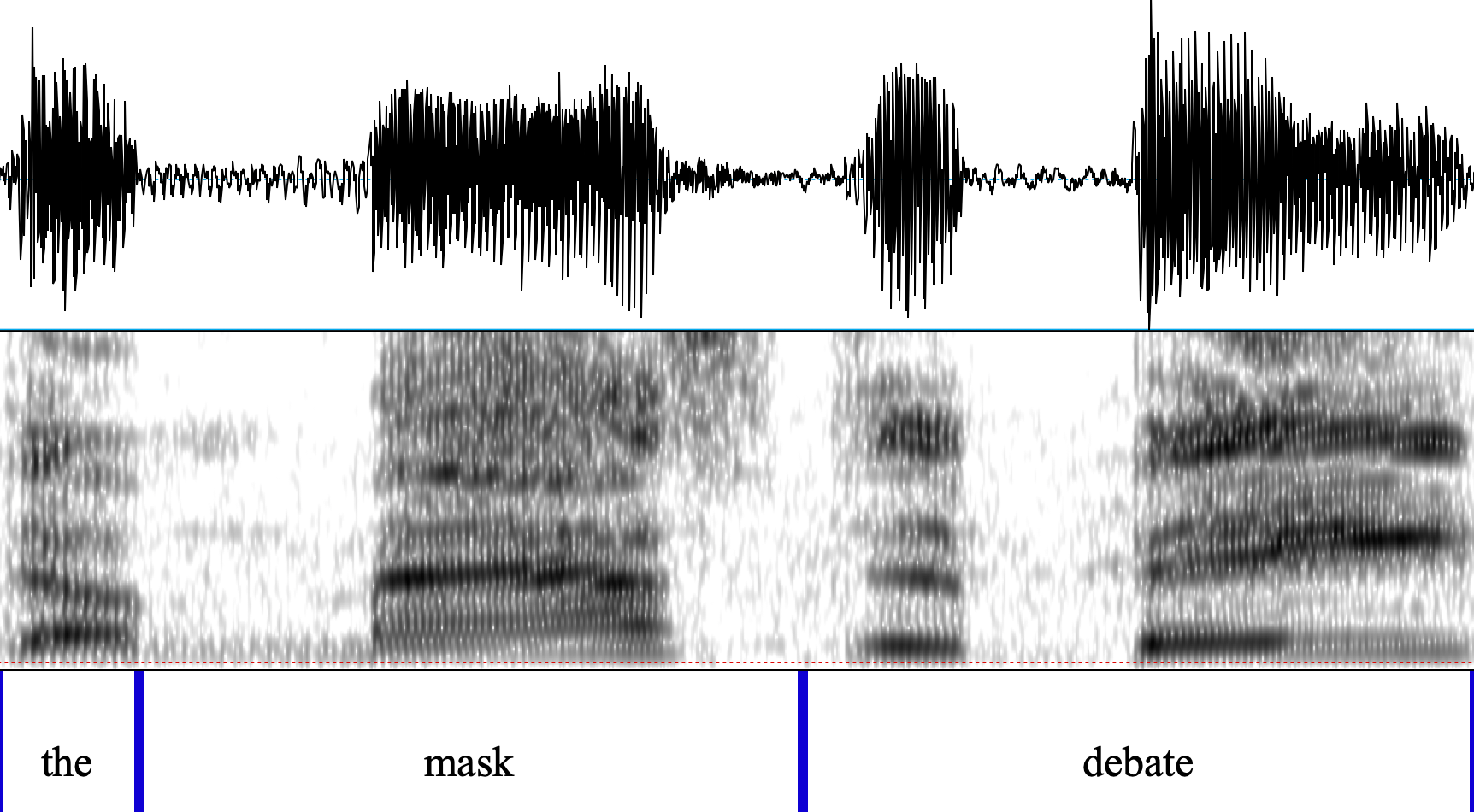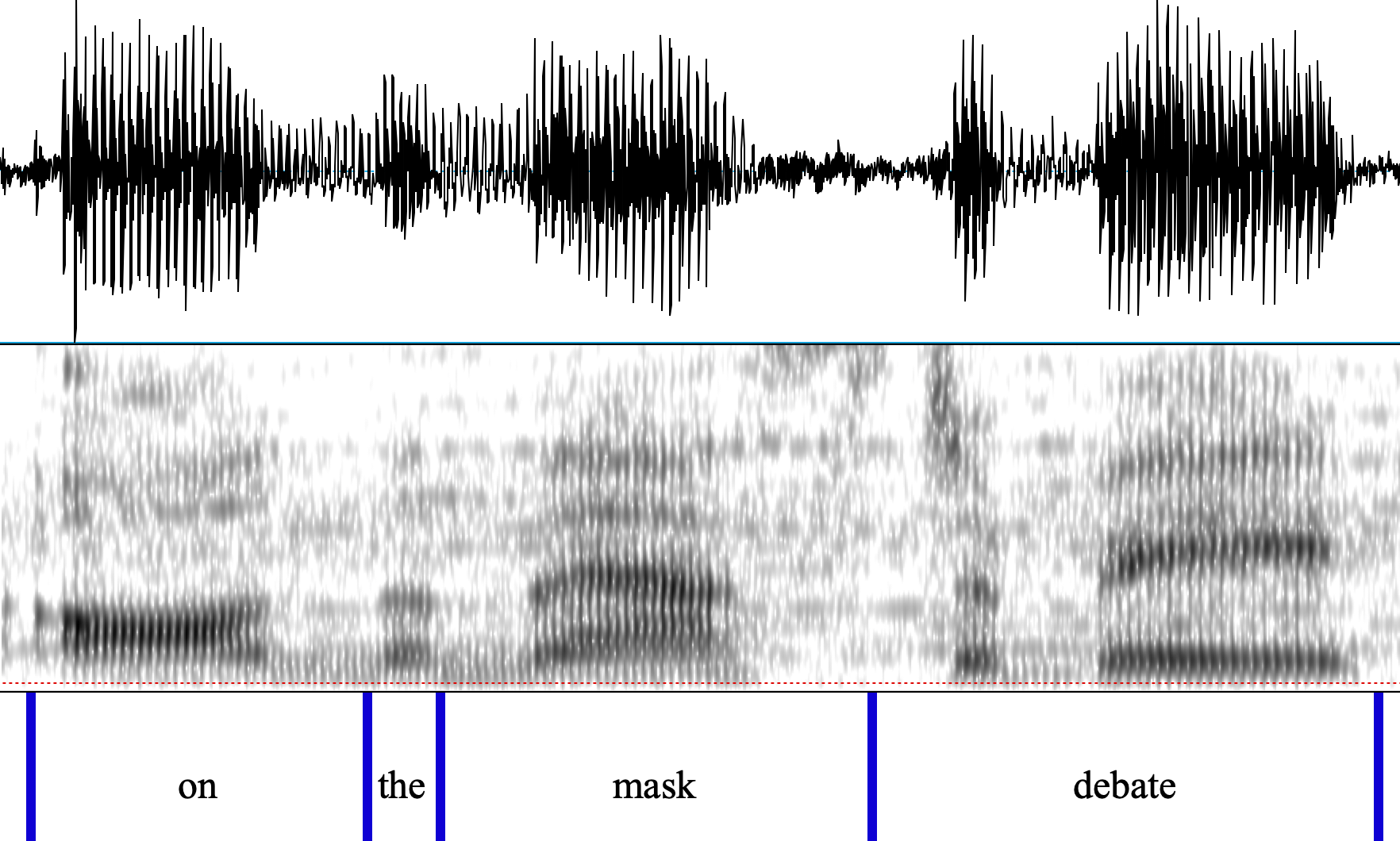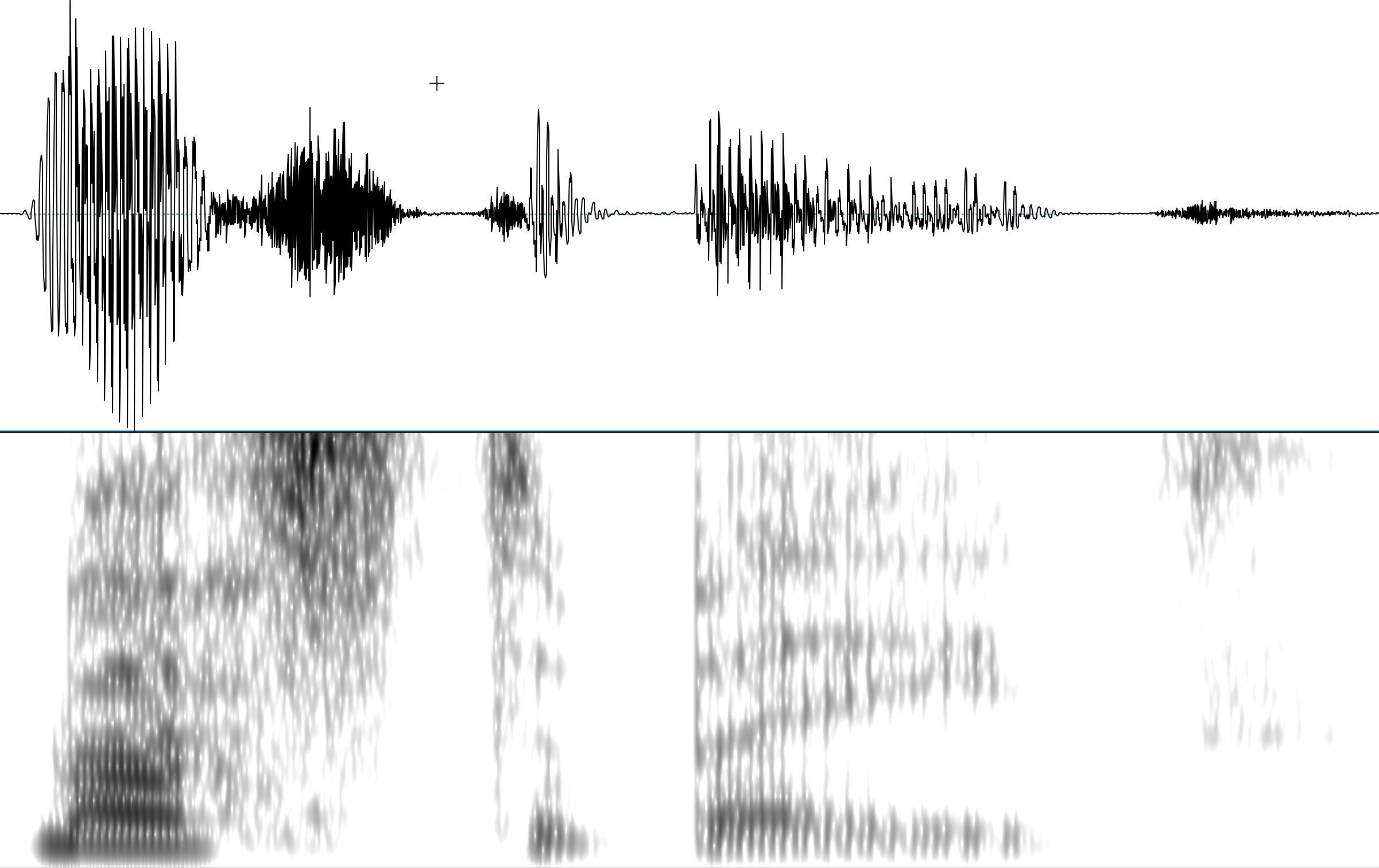Consonant lenition + r-less perception = FUN
« previous post | next post »
It's not just flapping and voicing of /t/ in words like litter (= "lidder") or pretty (= "priddy"), and word sequences like fat Albert (= "fad Albert"). American speakers tend to weaken all consonants and even consonant clusters in similar environments. So if you take today's ubiquitous "mask debate" news, and add the perceptual biases of someone from an r-less dialect like John Oliver, you get this:
Let's zero in on a couple of those "mask debate" performances:
As you can see and hear, there's not much if anything left of the /k/ in mask — for a listener with r-ful expectations, they might as well be saying "mass debate". And for someone who expects the medial vowel in masturbate to be [ə] rather than [ɚ], …
[If you want to do a more complete acoustic-phonetic analysis of more of the mask debate performances, a .wav version of the full sequence is here.]
Update — for some insight into John Oliver's perceptions, here's the OED's audio for (the British pronunciation of) masturbate:
The medial /t/ is aspirated, but only very slightly (as we'd expect adjacent to /s/), and you can probably persuade yourself that this might have been a rendition of "mass debate", which is pretty much how the U.S. news anchors pronounce "mask debate".



Q. Pheevr said,
August 16, 2020 @ 2:19 pm
Is this really about medial lenition, though? I would have thought it was cluster simplification, or just the absence of an audible release of the /k/ even if the closure itself is still there.
[(myl) I probably should have said "non-foot-initial" rather than "medial". For /t/ flapping and voicing, the generalization seems to be that foot-initial cases are strong aspirated stops, while everything else is variably weakened, assimilated, etc. So the final /t/ of "fast company" or "last Monday" is treated like the /k/ of "mask debate".
And you can see in the first example above that if there's a /k/ closure at all, its combination with the following /d/ closure is all off about 50 msec long…
Anyhow I've changed the title to "Consonant lenition" so as to side-step the issue.]
Jarek Weckwerth said,
August 16, 2020 @ 2:35 pm
Well, elision is the last stage of lenition, isn't it? (Unless, of course, you undestand lenition very narrowly as changing a fortis consonant into a lenis one…)
[(myl) Exactly. But there's a stage where the degree of lenition/deletion is variable, and then later on there's a stage where the lenited segment is entirely gone from the language, and in between …]
Peter Taylor said,
August 16, 2020 @ 2:42 pm
For my taste,
could have come a lot earlier. I read
and couldn't understand what it referred to, because I speak a rhotic British dialect and don't think there's any rhotic vowel in the word.
Thomas Rees said,
August 16, 2020 @ 5:37 pm
Surely the vowel sound of “mask" has something to do with it?
David L said,
August 16, 2020 @ 5:50 pm
Yes, for John Oliver and me, the vowel of 'mask' is a long a, as in father or balm, different from the short a of 'masturbate.'
Andrew Usher said,
August 16, 2020 @ 5:51 pm
I can readily hear many of the 'mask debate' examples as 'mass debate', with no, or practically no, /k/, but is this really particularly American? It's pretty much the same as weakening the 't' in 'last night', and I know that isn't.
But, no, the so-called humor of hearing 'masturbate' would surely not be thought up by a rhotic speaker.
Was the previous poster referring to the fact that many Brits say 'mask' with the broad A, but not 'masturbate'? Actually some do use it in 'masturbate' too, but less commonly. I think that's of less importance because they are all going to hear many others say it with the flat A, and so must be used to it.
But the difference of rhoticity, in unstressed syllables at least, is not so salient and I believe it likely that speakers can simply not pay attention to the difference between /ə/ and /ɚ/.
k_over_hbarc at yahoo.com
Antonio L. Banderas said,
August 16, 2020 @ 6:11 pm
What is the phrasal intonation of "mask debate"
LPD: ˈmæst ə |beɪt, ˈmɑːst- ǁ -ər-
KeithB said,
August 17, 2020 @ 8:45 am
Is this going to turn into one of those "Mike Hunt" things? Asking someone to page "Mask Debate in the Arizona room in 5 minutes"
Bob Ladd said,
August 17, 2020 @ 11:23 am
I think Thomas Rees, David L, and Andrew Usher are probably closer to figuring out the source of the cross-dialect problem – for someone speaking something like RP, what's going to cause them to access masturbate rather than mask debate is the quality of the stressed vowel in the first syllable (in Wells terms, TRAP rather than PALM), not the presence or absence of r-colouring on the fleeting unstressed vowel of the middle syllable.
For a well-controlled experiment, of course, we would need an alternative universe in which Jon Stewart was from the North of England.
Ellen K. said,
August 17, 2020 @ 12:35 pm
@Bob Ladd
I think you are looking at it backwards. It's not that the presence or lack of R-coloring affects what a RP-ish speaker, or other non-rhotic English speakers, perceives. (I can't personally comment on that.) It's that a rhotic American will not hear "mask debate" as sounding like "masterbate".
I see you are in Scotland (Edinburgh). My perception of Scottish speech is that the R's are different than American R's, and that it wouldn't have the R-colored vowels. If so, I can see your perceptions of the phrase might be different than an American's.
Of course, that doesn't mean that the vowel quality isn't a factor, for those for whom "mask" and "masterbate" have different vowels.
To my American ears, I definitely hear those as sounding like "mass debate". And definitely not like "masterbate". The vowel in the middle syllable is quite wrong for "masterbate".
Bob Ladd said,
August 17, 2020 @ 1:24 pm
@Ellen K: I am indeed in Scotland, but I spent most of my first 30 years in North America, so I'm probably perceiving mask debate about the way you are. My point was more about what might induce a speaker like John Oliver (not sure what made me write Stewart in my earlier comment) to hear it differently. I agree that for a native speaker of North American English the middle syllable is crucial in conveying the difference between mask debate and masturbate (probably helped, as Antonio Banderas's comment suggests, by subtle differences in the duration of the first syllable). But I think for anyone with a Southern English background, the vowel of the first syllable will be all wrong for mask and will leave them trying to interpret the whole phrase in some other way – and once they've gone down that route, the absence of r-colouring on the middle syllable will make masturbate a fairly plausible candidate.
Hans Adler said,
August 17, 2020 @ 3:02 pm
Native German speaker here who spent years in the UK and was never in the US.
There is absolutely no way I can hear any of these instances as "mask debate". For that, the k sound would be absolutely necessary, but it is very clearly not there.
As a result, and in connection with the priming for "masturbate", that was the only way I could hear it. In addition, since there has never been much of a mask debate in Germany (and what little there was has long been over by now), it took me a while until I could even guess what these people actually meant to say.
Once I had seen the proposal to hear this as "mass debate", I watched the video again. Now it seems to me that about half the instances are cases of "mass debate" and the other half of "masturbate". I make this distinction because for me, "mass debate" requires a certain minimal amount of stress on the a of "mass" (resulting in a different vowel quality) that I hear only in about half the cases.
Andrew Usher said,
August 17, 2020 @ 9:36 pm
The context matters. These sentences were originally in the middle of news stories that plainly had to do with masks, explaining why listeners at the time would hear 'mask debate' and not 'mass debate' – and certainly not 'masturbate', which is not even grammatical there, being the wrong part of speech.
The difference in context makes it impossible for me to judge if the intonation really overlaps with 'masturbate', but the difference is certainly not great. There is no relevant difference in the stressed TRAP vowel for Americans.
John Swindle said,
August 17, 2020 @ 10:02 pm
But what about the semantic overlap between "mask debate" and "masturbate"?
Philip Taylor said,
August 18, 2020 @ 3:22 am
From the perspective of a native speaker of <Br.E> — (1) what "mask debate" ?; (2) I hear almost no trace of a /k/ in any of the utterances, and as the first vowel sounds far more like /æ/ than /ɑː/ to me, I hear only "masturbate" or "mass debate".
Antonio L. Banderas said,
August 18, 2020 @ 6:53 am
@Philip Tayllor
https://www.phon.ucl.ac.uk/home/wells/syllabif.htm
Ellen K. said,
August 18, 2020 @ 8:53 am
@Philip Taylor
In American English, mask, mass, and masterbate all have the /æ/ vowel. Though you do seem to be illustrating how vowel quality affects perception for British speakers.
Although, back to the original post, how much would that vowel quality issue affect someone like John Oliver who has lived in the U.S., surrounded by American English speakers, for a good long while? (Although, he lives in New York City, so he's not exactly surrounded by standard American English, but by the variety of NYC accents.)
Leo said,
August 18, 2020 @ 9:56 am
Wouldn't the intonation of mass debate differ from mask debate and masturbate? With "mass" as an adjective modifying "debate" – meaning a debate involving lots of people – the stress would be on debate. That would leave the listener with just two choices when hearing the stress on mask.
Of course "mass" could be interpreted as a noun modifying debate, meaning a debate about the mass of something, or about a religious mass, in which case the stress would be on mass – but those would be unusual uses of "mass debate".
Ellen K. said,
August 18, 2020 @ 10:51 am
Seems to me a lot less odd to talk about a debate about Sunday mass, or to imagine physicists debating something about mass, then to imagine a large debate that would be called a "mass debate". What would that even be? A debate contest with, like, 1000 people? (A bunch of people on the internet debating something would be a massive debate, not a mass debate, to my mind.)
Leo said,
August 18, 2020 @ 12:48 pm
@Ellen K: I suppose it depends on the context. Physicists and theologians presumably debate mass pretty often among themselves, but it rarely makes the TV news. I don't think we need to put a number on "mass [as adjective] debate". How many people are needed for a mass brawl? Probably not many more than for a standard brawl.
I tried to ascertain the relative frequencies of mass as an adjective and as a noun in "mass debate" via Google, but the top hits all seem to be puns on masturbate – which at least shows Jon Oliver isn't the only one this possibility has occurred to.
Ellen K. said,
August 18, 2020 @ 1:36 pm
@Leo
Theologians? Um, no. Well, they might too. But many other church members might have debates about masses. Like how to have mass during a pandemic. And not actually even the realm of theologians, who, seems to me, debate about god, not the details of worship services.
Andrew Usher said,
August 18, 2020 @ 8:42 pm
I believe Oliver's examples were deliberately selected to have no perceptible /k/, not even as an interval of silence. I can't believe such never occur in American speech, after all.
Chris Button said,
August 18, 2020 @ 10:42 pm
@ Leo
I'm surprised no-one mentioned intonation until your post. If contrastive focus is placed on "mask" or "mass" then the intonation is similar to "masturbate". If there is no contrastive focus, then the intonation is different since the nucleus returns to the "bate" of "debate". Some of the anchors appear to be using contrastive focus, others don't. Then again, it's hard to compare because American newsanchors are trained to have a very unnatural intonation (presumably the idea is that it makes them clearer), so sentences are broken up into way more intonation phrases (each with their own nucleuses) than would occur in any natural speech.
George said,
August 19, 2020 @ 6:09 am
@John Swindle
It's been two days and nobody else has reacted, so I will.
Indeed.
KeithB said,
August 19, 2020 @ 8:44 am
The last "Mass debate" would have been Vatican II.
Ellen K. said,
August 19, 2020 @ 8:50 am
@KeithB
If I used a male name would you have paid attention to my comment above?
Kristian said,
August 19, 2020 @ 10:20 am
Is it a question of John Oliver's perceptional biases, though, or a New Yorker's? (he surely doesn't come up with all his own material, after all). To me many of those "mask debate"s sound a lot more like "masturbate" in certain New York accents than in John Oliver's accent. Am I wrong? (I'm no expert.)
As for "mass debate", Vatican II probably intensified it, rather than resolved it.
Andrew Usher said,
August 19, 2020 @ 10:12 pm
Referring to Vatican II as a 'mass debate' was a pun between the two meanings; the actual debate over certain aspects of Mass largely occurred after the council, not during it, as you say.
But that brings up something about the word 'debate': we tend to think of it as a somewhat organised and rational (if not formal) procedure, for that reason a random argument in the street would not normally be called a 'debate'. Calling the dispute over masks a 'debate' seems rather generous to both sides.
And while John Oliver may not write all his material, he surely approves of it, so I think using his accent is most reasonable. He also probably doesn't encounter the more local NYC accents that much of the time, and they would shift the vowels in mask, mass, and mast(urbate) all equally, anyhow, from the notionally standard American value.